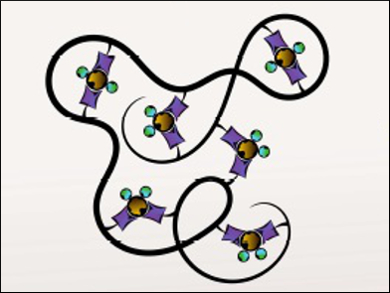Organometallic homogeneous catalysts are often more effective than their heterogeneous counterparts across a range of chemical reactions and under comparably mild conditions. On the other hand, heterogeneous catalysts are easily recycled. Catalytically active metal-functionalized polymers offer the best of both worlds.
Peter W. Roesky, Karlsruhe Institute of Technology (KIT), Germany, Christopher Barner-Kowollik, KIT and Queensland University of Technology (QUT), Brisbane, Australia, and colleagues have prepared single-chain nanoparticles (SCNPs) with narrow copolymer distributions by a nitroxide-mediated polymerization of styrene and 4-(diphenylphosphino)styrene. The polymer’s phosphine moieties were complexed with a platinum precursor. Under dilute conditions, intramolecular linkages lead to a collapse of the single chains into nanoparticles (pictured).
The team used the platinum(II) SCNPs as homogeneous catalysts in allyl alcohol amination and found activity that is on par with the well-known homogeneous catalyst cis-[Pt(PPh3)2Cl2]. Platinum(II) ions were identified as the active component in the polymeric structure. According to the researchers, this is the first example of metallo-SCNP post-catalytic recycling with retention of activity and selectivity.
- Platinum(II)-Crosslinked Single-Chain Nanoparticles: An Approach towards Recyclable Homogeneous Catalysts,
Nicolai D. Knöfel, Hannah Rothfuss, Johannes Willenbacher, Christopher Barner-Kowollik, Peter W. Roesky,
Angew. Chem. Int. Ed. 2017.
DOI: 10.1002/anie.201700718




